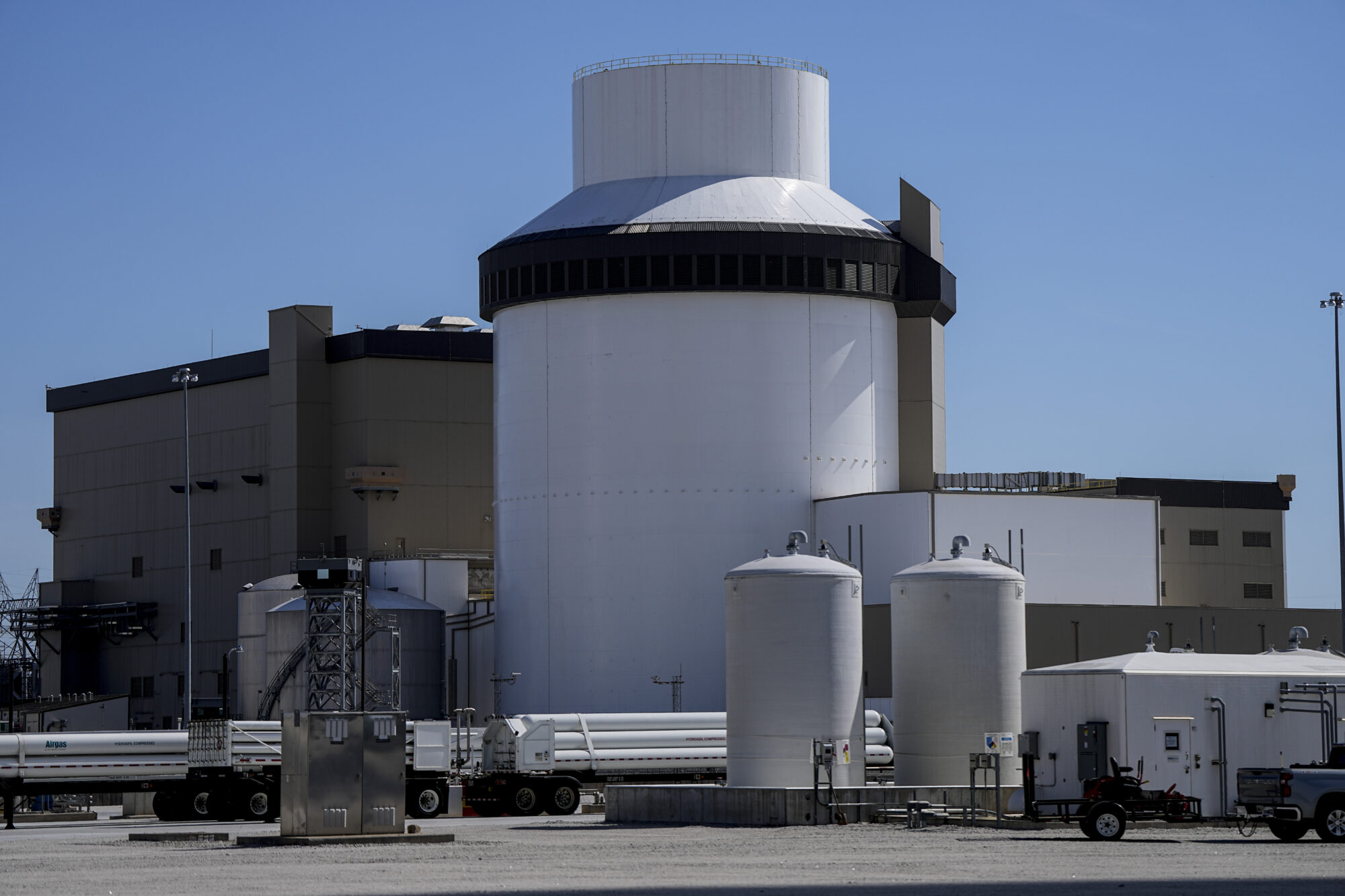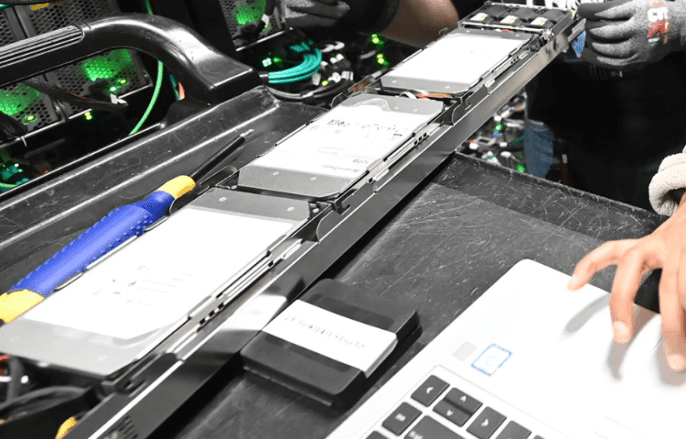
Reactor three is seen at the nuclear reactor facility at the Alvin W. Vogtle Electric Generating Plant, Friday, May 31, 2024, in Waynesboro, Ga. (AP Photo/Mike Stewart)
- Congress has passed legislation to spur new nuclear generation. Mississippi’s Public Service Commission is on board with the clean energy, as are tech billionaires.
In an increasingly rare bipartisan vote, the U.S. Senate passed the Fire Grants and Safety Act on Tuesday, legislation that included the text of the ADVANCE Act aimed at spurring new nuclear power generation in America.
The measure passed the Senate by a vote of 88-2. It previously passed the U.S. House in May by a vote of 393-13.
Mississippi’s two U.S. Senators and all three Republican Congressmen supported the legislation, while the state’s lone Democrat, Congressman Bennie Thompson, was recorded as not voting.
About the ADVANCE Act
The Accelerating Deployment of Versatile, Advanced Nuclear for Clean Energy, or ADVANCE Act is being hailed as one of the most significant pieces of legislation to come out of Congress in recent years as it seeks to encourage more innovation and investment in nuclear technologies.
Simplifying nuclear reactor permitting and deployment is a major part of the legislation as is reenforcing the staff at the Nuclear Regulatory Commission (NRC) while updating and revising the Commission’s authority and processes.
Nuclear power generation has gained bipartisan support in large part due to it being “clean energy” that is sustainable. Democrats have backed the move as they continue to call for less reliance on coal and natural gas. Republicans largely see it as a reliable option that does not come with the pitfalls associated with other green energy efforts within the Biden Administration’s “climate change” agenda, such as solar or wind.
With the passage of the ADVANCE Act language, the regulatory environment around nuclear power generation could become more favorable for investors, at least that is the hope as speed to market is increasingly important. Energy demands are skyrocketing as new technologies require more power, straining the nation’s power grid, and the need for the U.S. to be more energy independent becomes more evident by the day.
The legislation directly addresses growing national security concerns related to Russia and China. In April, Congress passed a measure banning Russian uranium imports, specifically unirradiated low-enriched uranium. This is a major step given that U.S. nuclear power plants imported roughly 12% of its uranium from Russia in 2022, according to the Energy Information Administration. In addition, China recently announced that the country is developing floating nuclear reactors able to generate power across the South Pacific. Russia already has similar technology.
Mississippi’s View of Nuclear
Northern District Public Service Commissioner Chris Brown (R) told Magnolia Tribune on Thursday that the three-man Public Service Commission (PSC) is very supportive of efforts to increase nuclear power generation in the state. In fact, the Commission passed a resolution in March voicing their support for the advancement of nuclear energy.

The resolution states that nuclear energy is a clean baseload energy source necessary to achieve a reliable, secure, and diversified energy grid, adding that nuclear energy is the largest source of clean power in the U.S.
The Mississippi PSC believes the advancements in Small Modular Reactors (SMR) demonstrate that nuclear energy should be at the forefront of energy policy discussions not just in the Magnolia State, but nationwide.
According to the International Atomic Energy Agency, SMR are advanced nuclear reactors that have a power capacity of up to 300 MW(e) per unit, which is about one-third of the generating capacity of traditional nuclear power reactors. This means they are a fraction of the size of traditional nuclear reactors and can be relatively easily assembled and transported while harnessing nuclear fission to generate heat to produce energy.
“I think nuclear is the future. It’s clean, it’s reliable. Overall, it’s inexpensive,” Commissioner Brown said. “I’m very pro-nuclear, that’s for sure. Things are moving really fast in this area. It’s exciting.”
When asked about the prospects of increased nuclear generation impacting Mississippi, the PSC Chairman said the Tennessee Valley Authority (TVA) is investing significant resources into the nuclear pool. TVA, which provides energy for a portion of North Mississippi, has partnered with Kairos Power, a California-based company, to deploy an experimental advanced nuclear reactor in Oak Ridge, Tennessee. The NRC approved the construction permitting for the facility in late 2023.

Brown said the test project is an SMR. Once the proof of concept is finalized, the plan is to deploy more in the TVA area.
“Where Mississippi comes in is Yellow Creek in Tishomingo County was approved for nuclear reactors,” Brown said, adding that the Commission is considering the possibility for using that site for future deployment of SMR by TVA.
The modular nature of the SMR makes them cheaper to construct and easier to place around the grid based on the energy need, often tying into existing infrastructure, Brown described.
“Our best shot in Mississippi for nuclear power in the near future is TVA locating reactors in North Mississippi,” Commissioner Brown said.
The Mississippi PSC is also planning to host a series of open meetings later this summer, with one dedicated to the possibility of Mississippi’s energy future as it pertains to nuclear as well as the costs and benefits of the technology.
“So, we’re being pro-active on this,” Brown added.
Tech Billionaires Buying In
Billion-dollar tech companies are also eyeing the future development and deployment of nuclear energy at a time when state and federal governments are moving in that direction. The private-sector push is largely being considered to support their large-scale power needs as data and artificial intelligence centers come online.

ARS Technica noted in April that electricity supply is becoming the latest chokepoint to threaten the growth of AI, according to tech chiefs, as power-hungry data centers add to the strain on grids around the world.
“Billionaire Elon Musk said this month that while the development of AI had been ‘chip constrained’ last year, the latest bottleneck to the cutting-edge technology was ‘electricity supply,'” ARS Technica reported. “Those comments followed a warning by Amazon chief Andy Jassy this year that there was ‘not enough energy right now’ to run new generative AI services.”
Musk has repeatedly expressed his support for increased nuclear power generation.
Amazon Web Services, which has invested billions in new data centers coming to Mississippi, recently acquired Talen Energy’s data center, Cumulus Data Assets, in Pennsylvania for $650 million. The 1,200-acre facility is powered by a neighboring nuclear power station owned by Talen.
Chris Sharp, chief technology officer at Digital Realty, an AI company out of Oregon, told the BBC that data centers in the not-too-distant future will come with their own dedicated, built-in nuclear reactors, perhaps by way of SMR.
“Our industry has to find another source of power,” Sharp declared.
The BBC also spoke with Dr. Michael Bluck with the Centre for Nuclear Engineering at Imperial College London. He said, “Data centres are power hungry things, but with AI we’re moving into a new level of power requirements.”
In addition, tech billionaires are getting in on the nuclear movement out of want to advance the “clean energy” technology as many seek net zero emissions supportive of the “climate change” agenda.
Earlier this month, the New York Times reported on a multibillion-dollar effort to build the first in a new generation of American nuclear power plants in Wyoming by Bill Gates. Gates is said to have poured more than $1 billion of his fortune into TerraPower. The start-up nuclear reactor company aims to change the way nuclear power is generated in hopes of reducing costs and risks while making energy reliable and sustainable.
“Mr. Gates became interested in nuclear power in the early 2000s after scientists persuaded him of the need for vast amounts of emissions-free electricity to fight global warming. He was skeptical that wind and solar power, which don’t run at all hours, would be enough,” the New York Times reported.
Now, Gates is betting that radically different technology will help.
“I’m not involved in TerraPower to make more money,” Gates said, as reported by the New York Times. “I’m involved in TerraPower because we need to build a lot of these reactors.”











